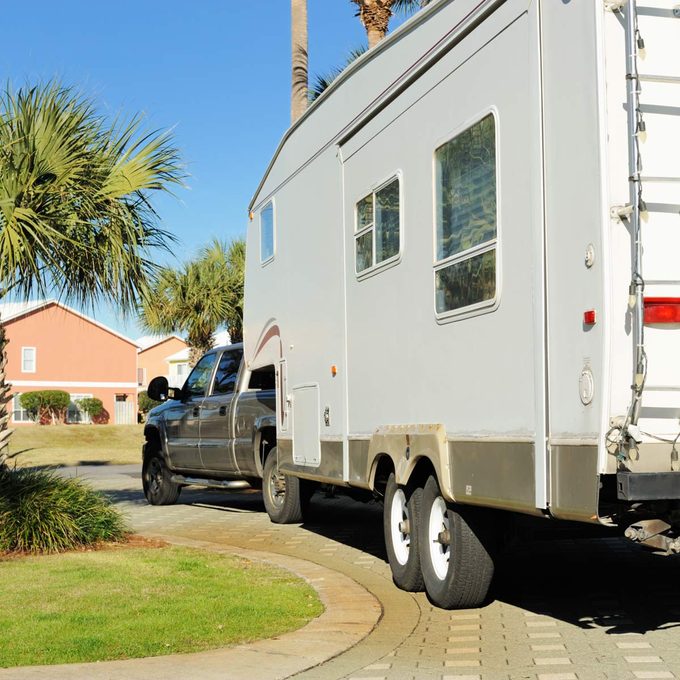10 Common Things a Homeowner Can Be Fined For
Here's a look at things that can lead to sometimes hefty fines, depending on local laws and covenants, along with ways to avoid them.
Every corner of America has its cultural quirks and climate, so it’s impossible to create a golden book of homeowner rules to spell out dos and don’ts. Cities and homeowners associations (HOAs) can dictate how long your lawn can be, how you maintain public right-of-ways such as sidewalks, and what you can or can’t put in your front or back yard. Check out these HOA horror stories.
Here’s a look at 10 things that can lead to sometimes hefty fines, depending on local laws and covenants, along with ways to avoid them.
On This Page
Be Discreet With Clotheslines
Sure, your grandma swore by spring breezes. But not everyone wants to see bras, panties and boxers blowing in the wind. Tuck a clothesline next to your garage or somewhere screened-off so neighbors aren’t staring at tighty-whities while sipping sangria on their patio. You can also look for natural ways to air-dry your clothes indoors.
Be Aware of What You Park Outside
Avoid fines for leaving your beloved camper, RV, large boat or classic car fixer-upper looming in your driveway several months of the year. Check local regulations and consider off-site storage for the off-season or a nicely screened side-lot location. (Here’s how to build a privacy fence.) Know that any visible vehicles on your property need a current license.
Check out 10 things you should never do to your car:
Don’t Go Native Without Permission
Urban or suburban neighborhoods may require trim, tidy lawns and limited gardens. Some places even fine homeowners if they have brown or dead spots on their lawn. If you yearn to launch any eco-projects, such as back-to-nature wildflower beds or fields, native prairie areas or supersized pollinator gardens, you may need to successfully lobby for an exception.
Be Water Savvy With Yard Projects
Don’t plan on water-guzzling tasks such as car washing or power-washing siding without checking on local restrictions, especially in drier states that may restrict these activities — or at least the timing of them. Other water-related projects that may require approval include water gardens, rain barrels and standing water in ponds or bird baths, which can boost the local mosquito population.
Ask Before You Feed the Birds
It may seem like a simple backyard pleasure, but some HOAs don’t allow feeding the birds. The feeding station — especially when seed spills to the yard or deck — can draw other critters like mice, wild turkeys, feral cats or even bears in some parts of the country. That may cause a nuisance or damage to homes.
Check Rules Before Setting Up Pools
Few summer yard improvements can be as welcome and fun as a pool. Before you invest in one — especially a more economical above-ground model — check local rules. Some neighborhoods may only allow in-ground pools, and many cities require fencing for safety.
Keep the Fun in the Backyard
Local aesthetics may likewise restrict playsets and play equipment, such as basketball hoops, trampolines, treehouses, swing sets, soccer nets and more. HOAs may relegate equipment to the backyard and restrict sizes and designs. Bikes, kayaks and recreational equipment, for example, may spark fines if stored in the yard.
Check Pet Regulations
Before falling in love with Fido or Princess Kitty, avoid fines (and potential heartbreak) by learning local pet laws. Some areas restrict the number of pets, the size of dogs, the breed and whether or not you can have an outdoor kennel. More unusual animals such as backyard rabbits or chickens, pot-bellied pigs or dwarf goats may be banned completely or require a special permit.
Get a Green Light on Home Exteriors
Home exteriors can be a major investment, so don’t add to it by racking up fines and requiring a do-over. HOAs and municipalities may dictate allowable paint colors, exterior materials and even the accent color you choose for shutters. Get pre-approval before buying paint or siding materials.
Keep House Numbers Clearly Visible
It may seem like a little detail, but your house number is vital and needs to be visible to emergency services, utility crews and delivery folks. Make sure numbers don’t fall off or become obscured by flowering shrubs, trees or seasonal decorations.





